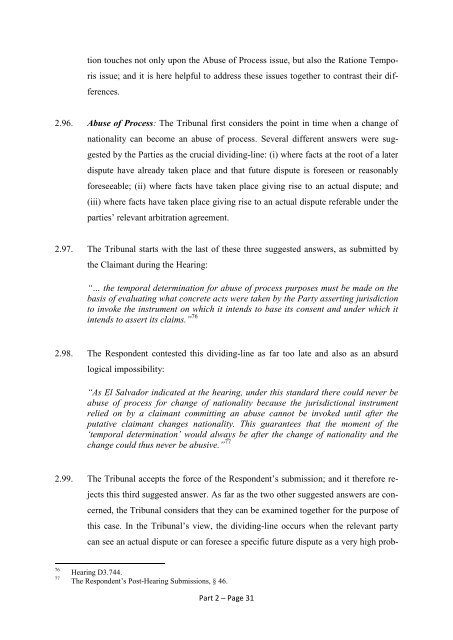brought under the dominican republic - central america - ita
brought under the dominican republic - central america - ita
brought under the dominican republic - central america - ita
Create successful ePaper yourself
Turn your PDF publications into a flip-book with our unique Google optimized e-Paper software.
tion touches not only upon <strong>the</strong> Abuse of Process issue, but also <strong>the</strong> Ratione Temporis<br />
issue; and it is here helpful to address <strong>the</strong>se issues toge<strong>the</strong>r to contrast <strong>the</strong>ir differences.<br />
2.96. Abuse of Process: The Tribunal first considers <strong>the</strong> point in time when a change of<br />
nationality can become an abuse of process. Several different answers were suggested<br />
by <strong>the</strong> Parties as <strong>the</strong> crucial dividing-line: (i) where facts at <strong>the</strong> root of a later<br />
dispute have already taken place and that future dispute is foreseen or reasonably<br />
foreseeable; (ii) where facts have taken place giving rise to an actual dispute; and<br />
(iii) where facts have taken place giving rise to an actual dispute referable <strong>under</strong> <strong>the</strong><br />
parties‟ relevant arbitration agreement.<br />
2.97. The Tribunal starts with <strong>the</strong> last of <strong>the</strong>se three suggested answers, as submitted by<br />
<strong>the</strong> Claimant during <strong>the</strong> Hearing:<br />
―… <strong>the</strong> temporal determination for abuse of process purposes must be made on <strong>the</strong><br />
basis of evaluating what concrete acts were taken by <strong>the</strong> Party asserting jurisdiction<br />
to invoke <strong>the</strong> instrument on which it intends to base its consent and <strong>under</strong> which it<br />
intends to assert its claims.‖ 76<br />
2.98. The Respondent contested this dividing-line as far too late and also as an absurd<br />
logical impossibility:<br />
―As El Salvador indicated at <strong>the</strong> hearing, <strong>under</strong> this standard <strong>the</strong>re could never be<br />
abuse of process for change of nationality because <strong>the</strong> jurisdictional instrument<br />
relied on by a claimant committing an abuse cannot be invoked until after <strong>the</strong><br />
putative claimant changes nationality. This guarantees that <strong>the</strong> moment of <strong>the</strong><br />
‗temporal determination‘ would always be after <strong>the</strong> change of nationality and <strong>the</strong><br />
change could thus never be abusive.‖ 77<br />
2.99. The Tribunal accepts <strong>the</strong> force of <strong>the</strong> Respondent‟s submission; and it <strong>the</strong>refore rejects<br />
this third suggested answer. As far as <strong>the</strong> two o<strong>the</strong>r suggested answers are concerned,<br />
<strong>the</strong> Tribunal considers that <strong>the</strong>y can be examined toge<strong>the</strong>r for <strong>the</strong> purpose of<br />
this case. In <strong>the</strong> Tribunal‟s view, <strong>the</strong> dividing-line occurs when <strong>the</strong> relevant party<br />
can see an actual dispute or can foresee a specific future dispute as a very high prob-<br />
76<br />
77<br />
Hearing D3.744.<br />
The Respondent‟s Post-Hearing Submissions, § 46.<br />
Part 2 – Page 31

















